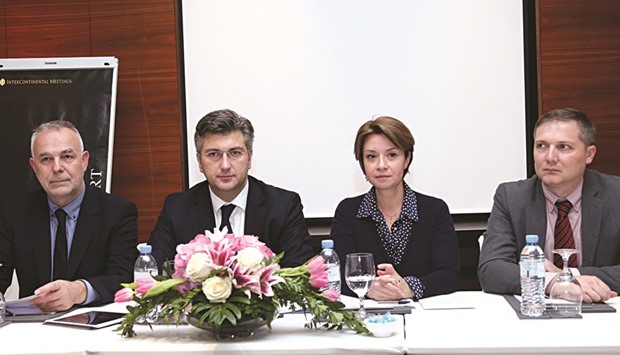A seven-member European Parliamentary (EP) delegation has expressed the hope that Qatar will adhere to its commitments to international labour forums on the protection of human rights of migrant workers in the country.
“Qatari officials have given us concrete assurances on the issue and we are optimistic that the human rights and living conditions of the workers will be adequately taken care of by the authorities,” the delegation’s leader, Andrej Plenkovic, said in Doha yesterday.
“Qatar has informed us about the improvements made in respect to the legislative framework in order to guarantee better working standards and human rights,” he explained.
The delegation met HH the Emir Sheikh Tamim bin Hamad al-Thani, Shura council chairman HE Mohamed bin Mubarak al-Kholaifi and Qatar Central Bank chairman HE Sheikh Abdullah bin Saoud al-Thani, among others.
Besides Plenkovic and Jozo Rados, both MPs from Croatia, the team consisted of Arnaud Danjean and Tokia Saifi ( from France), Afzal Khan (the UK), Pier Antonioc Panzeri (Italy) and Mark Demesmaeker (Belgium).
The Croatian MP said the local authorities and the team members shared a similar point of view on a host of issues, including the refugee crisis in Europe and the happenings in Syria, Yemen, Iraq, Libya and Egypt. “We also discussed latest developments in Iran,” said Plenkovic, while replying to questions on the team’s visits to Saudi Arabia and Qatar.
Plenkovic said that the European Parliament and European Union had enormous respect for Qatar as the country is positioned itself as “a vital player” not only in the region but also at different levels in Asia, Islamic world and globally.
Plenkovic said the European Parliament had enormous concerns on the developments in Syria which cost the lives of more than 100,000 people and triggered the unprecedented refugee crisis.
When asked about the amendments effected by EU members to facilitate visa on arrival to UAE citizens, the head of the delegation said the European Union rules pertaining to such issues were very cumbersome and a lot of deliberations and procedures were needed to be carried out before granting similar facilities to other GCC nationals.

Andrej Plenkovic, second from right, explaining a point as Jozo Radros, head of EU Secretariat Armelle Douaud and EU ambassador to Saudi Arabia Adam Kulach look on.
